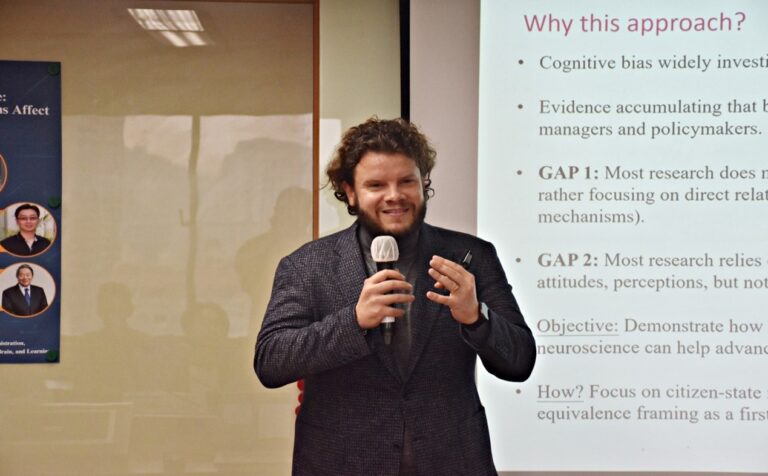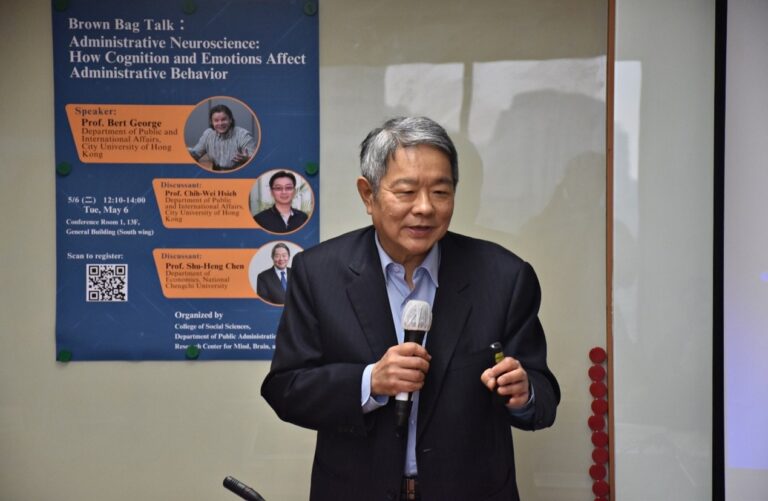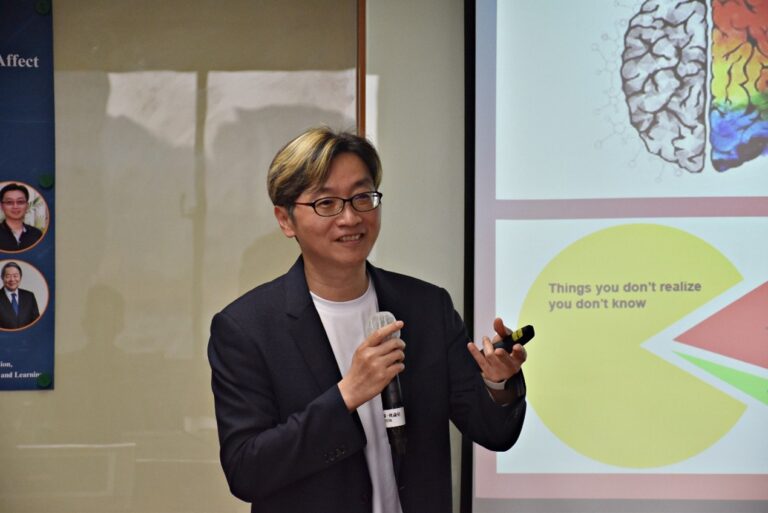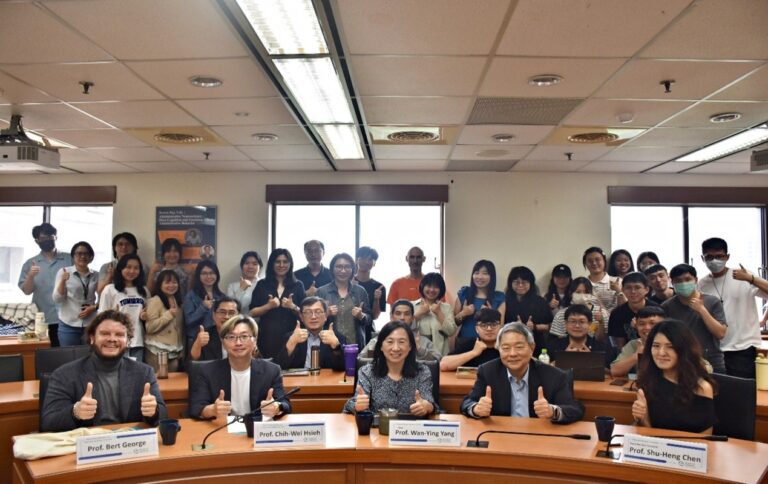On May 6, 2025, NCCU College of Social Sciences held its first jointly organized Brown Bag Talk with the Department of Public Administration (DPA) and the Research Center for Mind, Brain and Learning (RCMBL) in Meeting Room 1 on the 13th floor of the General Building. Titled “Administrative Neuroscience: Cognition and Emotion in Public Decision-Making,” the session was graciously moderated by Professor Bennis Wai-Yip So of DPA, featuring a keynote lecture by Professor Bert George from the City University of Hong Kong (CityU), with Vice President Professor Shu-Heng Chen (Department of Economics, NCCU) and Professor Chih-Wei Hsieh (CityU) serving as discussants. Fostering interdisciplinary theories and empirical studies, the panel introduced an engaging dialogue on how cognitive and emotional processes influence policy decisions.
In his opening remarks, So emphasized that recent developments in neuroscience, behavioral economics, and evolutionary psychology are prompting scholars to revisit long-held assumptions about rational decision-making in public policies. He introduced the concept of “emotional rationality,” a perspective that sees emotion not as a disruption to logic but as an essential element of human reasoning. “Inviting Professor George, a leading figure in strategic and behavioral public management, was part of an effort to spotlight the growing field of ‘administrative neuroscience’ and encourage cross-disciplinary engagement in rethinking governance.”
George further pointed out that neuroscience has become a critical tool in understanding behavioral economics and cognitive psychology, and is now increasingly being applied in the field of public administration. To address current research gaps, his team has conducted experiments in Hong Kong and Beijing using ‘equivalence framing’ by comparing the impact of phrases such as “90% satisfied” versus “10% dissatisfied.” These studies incorporate EEG (brainwave analysis), facial expression recognition, and eye-tracking to explore real-world behavioral responses. The findings suggest that negative framing can lower evaluations, not necessarily due to deeper cognitive effort, but likely due to emotional reactions. Language and cultural context also significantly shape interpretation. George emphasized that emotion and cognition have always influenced administrative judgment and called for integrating neuroscience into public administration. He noted that we should not adopt methods uncritically, but to leverage them in addressing practical governance challenges, such as reducing psychological burdens in administrative processes.
Prof. Shu-Heng Chen, the Vice President of NCCU, described administrative neuroscience marks a new stage in public administration research that combines rational analysis with emotional dynamics. He highlighted the importance of psychological factors such as bias, emotion, and framing in shaping policy choices. Referencing theories such as the Somatic Marker hypothesis, the dopamine system, and the work of Kahneman and Gigerenzer, he argued for the value of integrating tools like eye-tracking, fMRI, and agent-based modeling to tackle bureaucratic complexity and promote the development of “neuro-social science.” Nevertheless, it should be noted that overly optimistic dependence of this disciplinary should be cautioned, despite its profound potential. Prof. Chih-Wei Hsieh offered an akin, cautionary insight. He pointed out that popular neuroscience narratives often reflect our limited understanding of the brain and warned that experimental methods are prone to biases like the Hawthorne effect. Hsieh underscored the need to ask deeper questions about the meaning and applicability of such research, warning that technological advancement alone does not guarantee relevance to practical administrative value.
Following the presentations, an engaging discussion ensued with faculty members and students actively raising questions. Director of RCMBL Professor Ting-Ting Chang opened the floor by asking how eye-tracking and EEG data could enhance our understanding of administrative behavior, and whether neural signals alone can account for the complexity of human action. In response, George explained that his research, informed by neuroeconomics, uses gaze duration and basic EEG as complementary tools to theoretical models. He emphasized that the value of these methods lies not in their technological advancement, but in their ability to generate meaningful insights for public administration. Addressing concerns about research ethics raised by DPA Professor Tun-Yuan Chen, George noted that all of his experiments employ non-invasive techniques, although stress-inducing countdown feature was advised to be revised following ethical review at earlier stage. He underlined that innovation must always be grounded in ethical responsibility. The conversation then shifted to research development, with DPA Associate Professor, Dr. Kai-Ju Chang asking what drives progress in this emerging field. Prof. George indicated that passion and sustained commitment are often more crucial than continual financial resources, though he alerted against letting enthusiasm become excessive. The discussion concluded with a question from doctoral student Jeff Chen about the role of George’s theory in administrative neuroscience. George remarked that while public administration often relies on middle-range theories and applied frameworks, the real promise of administrative neuroscience lies in its potential to deepen our understanding of the cognitive and emotional foundations of policy decision-making.
The Brown Bag Talk demonstrated both the prospects and challenges of administrative neuroscience as a growing interdisciplinary field. It encouraged deep reflection on the role of emotion and cognition in decision-making, while emphasizing the importance of theoretical grounding, ethical integrity, and practical relevance. Through Prof. George’s research and the diverse perspectives of the discussants, the event successfully bridged the gap between brain science and policy studies. As more scholars engage with the field, administrative neuroscience may not only expand our understanding of public sector behavior, but also reshape the future of governance that grounded in both scientific insight and real-world impact.




